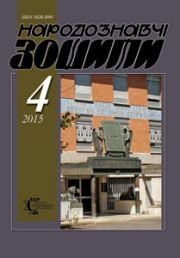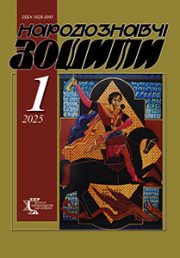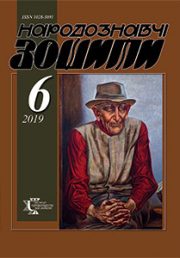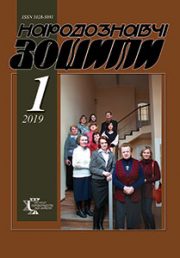The Ethnology Notebooks. 2021. # 1 (157), P. 65—72
УДК 94 (477) (092)
DOI https://doi.org/10.15407/nz2021.01.065
Volodymyr NAKONECHNYJ
- ORCID ID: https://orcid.org/0000-0002-0386-2162
- PhD (History), Assistant Professor,
- Department of International Relationships,
- Kyiv National University of Culture and Arts,
- 36, Yevhen Konovalets Str., 01601, Kyiv, Ukraine,
- e-mail: nakonechniy.ua@gmail.com
For the first time in historiography, the article analyses the discussion of the problems of Lemko emigration on the pages of the newspapers «Lemko» and «Our Lemko».
The relevance of the article lies in the need to clarify the peculiarities of the life and work of Lemko emigrants in the second half of the 1930s on the basis of Lemko periodicals of the interwar period.
The subject of the study is the peculiarities of the discussion of various emigrant issues in the pages of Lemko newspapers.
The purpose of the study is to analyse the emigration discourse of Lemko periodicals published in the Second Polish Republic.
The source of this historical research is the newspapers «Lemko» and «Our Lemko», which were published in the Second Polish Republic and expressed various trends in the public life of the Lemkos.
Methods. The article uses such methods and approaches as systematic, comparative and critical analysis of the source base, represented by large text arrays. The application of the content analysis technique made it possible to carry out the correct interpretation of newspaper information of various genres.
Conclusion. The article examines the coverage of the problems of Ruthenian emigration by the newspapers «Nash Lemko» and «Lemko». It has been proved that most Ruthenian newspapers wrote about the causes and destinations of emigration, as well as covered the life of the Lemko diaspora in the United States, Canada, Brazil, Uruguay, Peru and others. Newspapers published a variety of information about the conditions of emigration to a certain country, the cost of travel and its logistics, possible dangers and more. This information was printed alongside warnings about various fraudsters that attempted to profit from Lemko’s misfortune and lure the last money from gullible peasants with lies about the «promised land».
The article has concluded that the active and solidary discussion of emigration issues by Lemko periodicals contributed to the unification of Ruthenians both in exile and at home.
Keywords: Lemkos, emigration, the Second Polish Republic, «Nash Lemko», «Lemko».
REFERENCES
- Tarnovych, Yu. (1935). Is there anything to be sorry for? Is America a true «promised land»? Our Lemko, 1 (25), 7 [in Ukrainian].
- (1935). Unemployed in the countryside. Lemko, 25 (60), 1 [in Ukrainian].
- (1934). The grass is greener on the other side. Our Lemko, 9, 4 [in Ukrainian].
- (1934). To our brothers in a foreign land. Our Lemko, 1, 5 [in Ukrainian].
- (1934). To you, brothers Lemkos, in America! Our Lemko, 5, 4 [in Ukrainian].
- (1934). To our readers. Our Lemko, 1, 2 [in Ukrainian].
- (1936). Emigrational comedy. Lemko, 2 (86), 2 [in Ukrainian].
- (1936). Collective sacrifice of our brothers overseas. Our Lemko, 4 (52), 7 [in Ukrainian].
- (1935). Convention of Lemkos in New York. Our Lemko, 19 (43), 5 [in Ukrainian].
- Karachaba, S.P. (2003). Emigration from Western Ukraine (1919—1939). Lviv: Ivan Franko National University of Lviv [in Ukrainian].
- Kostarevich, O. (1934). Our Lemko, 1, 3. [in Ukrainian].
- (1934). The grief of Lemkos or what concerns us most. Our Lemko, 1, 3 [in Ukrainian].
- (1935). Lemkos in America versus Huniak Lemkos. Our Lemko, 17 (52), 2 [in Ukrainian].
- (1934). Do not emigrate to Slavonia! Our Lemko, 17, 4 [in Ukrainian].
- (1935). On Lemkos emigration to Siberia. Lemko, 5 (40), 2 [in Ukrainian].
- (1934). Oh, it won’t be that well, Vanya Gunyaka! Our Lemko, 17, 3 [in Ukrainian].
- (1934). What «Our Lemko» is going to write about. Our Lemko, 1, 2 [in Ukrainian].
- (1935). Ukrainian Lemkos are the best workers. Our Lemko, 6 (30), 2 [in Ukrainian].
- (1935). The conditions of sale of land in Brazilian colony «White Eagle». Lemko, 24 (59), 2 [in Ukrainian].
- (1937). A valuable letter from America. Our Lemko, 7 (79), 5 [in Ukrainian].
- (1936). A harmful sport. Lemko, 17 (101), 1 [in Ukrainian].







